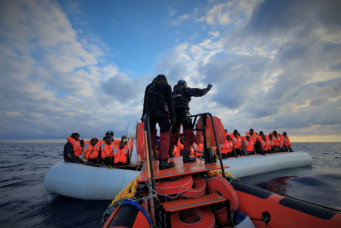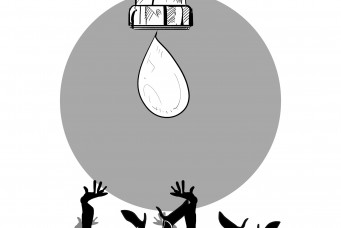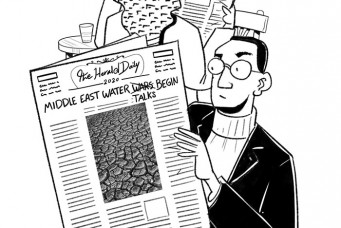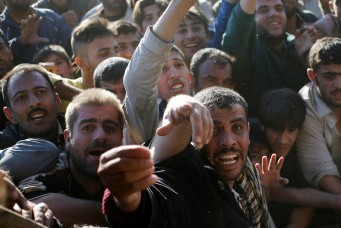Enhancing Mediterranean Integration
Trade liberalization, human capital development, and sectoral reforms can bring Mediterranean countries closer together.

Drilling vessel Scarabeo 9, owned by Italian oil service group Saipem, sails in the Bosphorus?on its way to the Mediterranean Sea, in Istanbul, Turkey, April 13, 2020. Yoruk Isik/Reuters
Previous studies on regional integration across the Mediterranean outlined a large potential to increase trade flows of goods and services, to be developed in order to contribute to the economic and social cohesion of the region. The thought was that countries could benefit from a large regional market while also promoting foreign direct investment and mobilizing people across both shores of the Mediterranean.
Yet, the three interlinked dimensions of regional integration—foreign direct investment, trade of goods and services, and ultimately, mobility of peoples across the Med region—seem to have fallen short of the ambitious objective embraced by the seminal Barcelona Declaration twenty-five years ago. The stated goal of the declaration was to turn “the Mediterranean basin into an area of dialogue, exchange and cooperation, guaranteeing peace, stability and prosperity”.
CMI’s Updated Integration Vision
While advocating the merits of such objectives, the Center for Mediterranean Integration (CMI) has recently attempted to provide an updated and enhanced vision for regional integration in today’s context. Based on recent analysis, the CMI’s three-prong approach recommends further eliminating tariffs and non-tariff barriers to the trade of goods and services, with a strong emphasis on the trade of services. This is due to the effect of services on productivity and job creation that can spill over to agriculture and industry, including the fields of information, telecommunications and technology (ICT).
The CMI’s approach also recommends increasing the mobility of workers and jobs within the Mediterranean region through proactive and regularized migration policies. Finally, the CMI suggests that further promoting investment and private sector businesses and partnerships between parties on both sides of the Mediterranean will be key to the socioeconomic transformation of the region.
Fundamental to the CMI’s vision is the belief that trade liberalization cannot be dissociated from sectoral reforms. As such, removing tariffs, alone, will not result in economic growth. As long as trade restrictions remain in critical areas such as transport, infrastructure, regulations, logistics, digitalization, and financial intermediation, no real economic and political progress will be made. Such restrictions not only increase trade costs, but also make diversification and upscaling more difficult, therefore delaying structural transformation which, in turn, decreases opportunities for trade exchanges.
In addition, trade liberalization should not be implemented alone, but rather in the context of a comprehensive policy package that aims to achieve social and distributive goals in addition to efficiency gains. First, the static efficiency gain generated by trade is expected to be accompanied by scale effects linked to the possibility of operating in a larger market, as well as positive externalities associated with technology transfers and better positioning of the region in global value chains.
This process is exemplified by the possibility of adopting co-production approaches between European and Southern Mediterranean companies, allowing investors from more advanced countries to support local initiatives in the South by transferring know-how and technology, which permit the production of higher-value-added goods in the South.
In the long run, regional integration should contribute to a gradual convergence of average salaries between countries, an essential element for social cohesion. Since it is anticipated that increased trade flows will cause income levels to rise in exporting sectors while income in the other sectors focused on local consumption may experience a decrease, other policies must be adopted to mitigate emerging income disparities. Policymakers must also acknowledge that not all territories within the region will be equally affected by the re-allocation of factors due to trade exchanges, given their different geographic locations and endowments such as land and human capital. Therefore, territorial cohesion policies targeting vulnerable areas should be designed as part of the policy package.
Economic efficiency gains associated with trade reforms will also depend greatly on the mobility of people within the region. Such mobility is desirable to allow for the acquisition of the relevant knowledge, the exchange of ideas, the upgrading of skills, and the transfer of techniques and scientific discoveries. However, without migration policies aiming at managing legal migration flows, including circular migration, and better dialogue (bilateral and multilateral) among countries in the region, the potential of workers’ mobility, both as a growth determinant and as a social inclusion factor, will remain underexploited.
With the aim of mobilizing additional investment in the region, greater support from international partners such as the European Union and international financial institutions like the European Investment Bank, the European Bank for Reconstruction and Development, and the World Bank, as well as neighboring states, will still be needed. Such support—if provided as part of a proactive, partnership-based, co-development approach—could serve as the catalytic factor needed to trigger the transformation of the region. It could materialize through projects of common interest, scaled-up to involve countries on all shores of the Mediterranean, East and West, North and South.
This transformation will also require a coordinated approach to enhance the attractiveness of the region to private foreign investors, especially in countries where the public sector still occupies a large percentage of economic activities, crowding out the emergence of smaller private-owned businesses. Regulatory reforms as well as measures to improve the overall business environment and monetary and fiscal (non-tax) incentives, as opposed to arbitrary tax exemptions, should be envisaged. In this context, co-production schemes involving small and medium-size enterprises within the region will be essential for transferring technology and know-how, while also contributing to job creation.
In sum, this overall approach points toward further promoting growth through comprehensive trade reforms, while also fostering the mobility of workers through regularized migration schemes. CMI wants to inspire policymakers to follow a path that will promote foreign direct investments and cross-country private-public partnerships. In parallel, the provision of regional public goods and more targeted initiatives aiming at protecting some vulnerable income groups and less-favored geographic locations will be necessary to reduce and prevent income disparities.
Providing Regional Public Goods
Regarding the provision of regional public goods, two areas can be singled out as crucial for the consolidation of regional integration: human capital and the environment, particularly, building resilience to climate change. The provision of these two common goods cannot be addressed through a strictly competitive approach. Extensive collaboration between participating nations in these two strategic and symbolic areas could make an immense contribution to future growth paths of the region.
Human capital is involved in knowledge production, namely research, the dissemination of ideas through education and employability gained with the acquisition of know-how, which is directly useful to companies for technical and professional training. Indeed, regional development of human capital will be one of the main factors determining the success of the integration process in the Mediterranean, as it will contribute to growth through the development of a knowledge economy and more innovation. The development of innovation will facilitate human mobility between countries and sectors and enable cultural interaction.
In this vein, student mobility is absolutely necessary to underpin human capital formation. Following the example of Europe, which has created several successful cooperation schemes, programs involving students from all Mediterranean countries should be designed in order to facilitate knowledge sharing throughout the region.
Closer involvement of large European training institutions in teaching students from Eastern and Southern countries could also provide European companies with a new incentive to invest heavily in those Mediterranean countries. These developments are essential to ensure progress on a third element, which is instilling a thirst for knowledge acquisition among young people in “the sectors of the future”, in addition to improving the quality of educational provision and responding to labor market demands, all of which are involved in the building of human capital.
The second area of focus relates to another essential regional public good: the environment (referring to the quality of air, water, and land), particularly in response to acute climate change threats, which are of particular concern in the region. There are numerous natural comparative advantages to be harnessed in the region using abundant natural resources and renewable energies, which integrated environmental policies (across sectors) could facilitate. As highlighted by several pieces of research, issues related to water, energy, and food cannot be considered separately in the region because of the numerous interactions between the sectors. Together, they can be at the heart of solutions to future crises. Proactive environmental policies integrating these three sectors could offer significant economic and job creation opportunities in Mediterranean countries.
The energy sector, a truly regional public good, offers the greatest potential. In addition to reducing the carbon footprint of Mediterranean countries, investing in renewable energies (solar, wind, etc.) can aid in the development of technological leadership in this sector, provide jobs, and secure access to an affordable source of low-carbon electricity for all Mediterranean countries, including those in the European Union.
Euro–Mediterranean electricity market integration makes it possible to connect countries of the southern shore, which are rich in carbon-free energy resources, with countries of the northern shore, which have a strong appetite for carbon-free electricity—and are willing to pay for it. Connectivity is key to energy transition and requires availability and efficient use of inter-connectors. However, such inter-connectors are notoriously difficult to finance and implement. Regional market integration would expand throughout Europe access to low-carbon supply sources such as hydro reserves (as in Norway) and plentiful solar power in Southern and Eastern Mediterranean countries.
In order to successfully achieve regional energy market integration, policymakers, energy companies, and regulators from the North and South of the Mediterranean need to embrace the benefits of Euro–Mediterranean electricity market integration. Maintaining a network of experts, government representatives, and energy players from around the Mediterranean is essential to share best practices and influence policymaking. If Mediterranean countries were able to cooperate in this area, with support from the EU and perhaps other multilateral institutions, this would give rise to solidarity across the Med region, with the ultimate result being a powerful economic bloc.
The Water-Energy-Food Nexus in Mediterranean Integration
Using a similar perspective, it is necessary to promote an integrated regional approach to manage water scarcity, which is severely aggravated in the Mediterranean—a region that is among the world’s most vulnerable to climate change. Water is, by definition, a global issue since watercourses connect countries and the factors contributing to its depletion, including climate change, affect the whole world. In the Mediterranean region, the main goal would be to tackle water management by focusing on strengthening collaboration and integration between the different basin countries.
Water scarcity and related insecurity in the region have been drivers of forced migrations, instability, and conflict. These phenomena are expected to be aggravated in the future. Together with the increase of demography, the effects of climate change will have a tremendous impact on the water sector. Coming changes will include a decrease of water availability ranging from 2 percent to 15 percent in the case of a 2 degrees Celsius increase of temperature. Also, water scarce populations—i.e., people living with less than 1,000 m3 of water per year—are expected to rise over 250 million during the next twenty years.
Mediterranean countries face similar water management challenges rooted in inefficient conventional water governance systems and obsolete management practices. In order to meet future regional water supply needs, it will be essential to adopt a resilient and integrated approach in the water sector while placing cooperation at the core of the process. A cooperative framework that creates an environment that enables all stakeholders to be heard and included is a prerequisite to ensuring efficient and effective management. Moreover, in the definition of smart solutions, emphasis should be placed on engaging vulnerable communities and often forgotten population groups such as women and youth.
Regarding food production, the region offers huge trade potential because of geographical proximity. The Mediterreanean region is perfectly situated between Africa and Europe and has similar resources and common consumption patterns, which are especially important in food industries. Furthermore, agricultural production has clear positive spillover effects for water, health, and biodiversity and also revitalizes rural areas and offers income earning opportunities in remote locations, further contributing to territorial cohesion. One of the main advantages of trade liberalization in the region is the possibility of occupying a competitive position in the market for certain Mediterranean food products. This could allow producing countries to adopt higher quality standards and create brands, rather than just supplying intermediary products to European distributors to promote them under their own brands.
The impact of growing water scarcity on agriculture is, however, worrisome, as the sector is the main water consumer. Reducing the dependence and demands of the food and energy sectors on water should be the overarching objective of water-energy-food policies in a water-constrained region. Transitioning to renewable energy can contribute to both making water more available and reducing CO2 emissions. To reach this critical objective, multiple strategies can be developed and implemented to increase nonconventional water supply sources and transform energy systems toward low-carbon solutions. Increasing intersectoral collaboration will be key in addressing water-energy-food nexus challenges. Regional partnerships with national, regional, and global actors should foster development and trust across countries, leveraging resources and knowledge needed to develop innovative and inclusive solutions.
By integrating these three sectors, the Mediterranean region could become a model for the world by promoting the use of renewable energies to find solutions to water scarcity as well as more efficient agriculture practices and production techniques. In turn, more equitable access to water could also contribute to food diversification and preserving the stability of rural ecosystems, which will be essential for territorial cohesion and climate change mitigation.
Reflections in the Midst of the COVID-19 Crisis
While our analysis was conducted before the COVID-19 pandemic shocked the world, our approach must internalize the effects of the coronavirus, particularly since the Mediterranean region has been hit hard. No country in the region has been spared from its tragic effects and economic spillovers, such as the negative price of oil for the first time in modern history.
When trying to adopt measures to combat this unprecedented crisis, every country in the region initially faced what appears to be a trade-off between saving lives and saving livelihoods. The ongoing global recession is amplifying other adverse effects, all of which require adequate responses to facilitate recovery and stimulate the economy, of the health crisis on the region’s population. In particular, vulnerable population groups are in need of immediate support. Well-targeted measures must be implemented to mitigate losses in per capita income and living standards and, in some cases, to avoid a humanitarian crisis.
Facing this shock, the notions of collaboration and cooperation among countries appear more relevant than ever. First, the virus does not know boundaries. Second, no country should fall behind in finding remedies. While every country is facing its own effects, dialogue in search of regional and global solutions appears, once again, essential.
We cannot forget that the links that unite Mediterranean countries should be at the heart of the response. In the medium term, the crisis may offer an opportunity to circumvent the lives-livelihoods trade-off by promoting economic activities that build on the human capital of the region (such as training and mobility of health workers) while also respecting the environment (reopening renewable energy activities for job creation). This is not the time to refocus on national issues without looking at the regional context. On the contrary, regional solutions to the post-COVID crisis should further contribute to the noble goal of Mediterranean integration.




